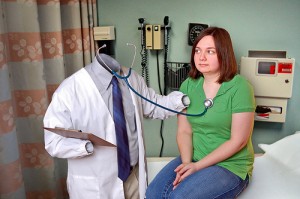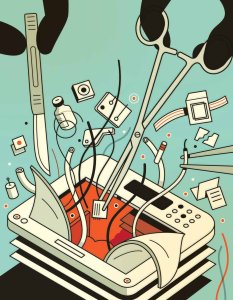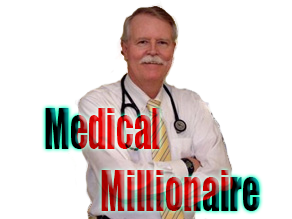 I have been seeing a number of articles recently about the primary care physician shortage, or “crisis” depending on whom is writing the article and where it is being published. If someone is just now recognizing that there is a PCP shortage, he or she must have been living with his or her head in the sand for the past 20 years, or is a modern version of Rip Van Winkle.
I have been seeing a number of articles recently about the primary care physician shortage, or “crisis” depending on whom is writing the article and where it is being published. If someone is just now recognizing that there is a PCP shortage, he or she must have been living with his or her head in the sand for the past 20 years, or is a modern version of Rip Van Winkle.
As a primary care representative on a number of statewide and local committees, I have discussed this issue several times in the past. In doing so, I have felt like the living manifestation of the motto of my alma mater Dartmouth College, “Vox clamantis in deserto”: A voice crying in the wilderness. Despite being the PCP of record in these venues, I truly felt that no one was listening to me.
At one point in time, I tried to make the other specialists and the hospital and insurance administrators aware that many of their programs actually made the existing PCP’s life and practice worse and less inviting to young doctors coming through the pipeline of medical school and residency. The constant nickel-and-diming of prior authorizations for studies and medications drains the energy of the PCP.
 Electronic records, which were initially seen by others as a panacea, have frustrated providers and reduced their productivity & their ability to communicate with their patients. Rather than making primary care medicine more attractive to the younger professional, most of the initiatives to improve medical care have been built on the backs of the primary care providers. PCPs do most of the grunt work and share very little of the reward, if there is any.
Electronic records, which were initially seen by others as a panacea, have frustrated providers and reduced their productivity & their ability to communicate with their patients. Rather than making primary care medicine more attractive to the younger professional, most of the initiatives to improve medical care have been built on the backs of the primary care providers. PCPs do most of the grunt work and share very little of the reward, if there is any.
In these committee meetings, you could hear a pin drop when I brought up the next topic: Money. It is no surprise to anyone that most medical school graduates are carrying over $200,000 worth of loans into their residency and practice years.
If they are a married medical couple, and there are more of those lately, the loan portfolio load can reach over a half million dollars. This weight affects decisions these doctors will make.
These are very smart people. Despite what is said about doctors and their ability to handle money or not, this is actually relatively simple math.
Should I leave my internal medicine, family practice or pediatric residency and practice primary care in an office setting because there is a need, or should I extend my education by a few more years to become a specialist and make twice as much money for the rest of my life? Hmmm . . . Let me think!
 Another option that has become very popular for those who don’t want to do the extra time in fellowship is to become a hospitalist or ER doctor. The salary is not double, but it is a lot higher than the office practice compensation.
Another option that has become very popular for those who don’t want to do the extra time in fellowship is to become a hospitalist or ER doctor. The salary is not double, but it is a lot higher than the office practice compensation.
Also, PCPs can practice in what they are well trained, which is hospital based medicine. They also don’t have to deal with the hassles of modern medicine like call schedules, nursing home coverage, and paperwork, even in the age of EHRs.
A cardiologist at one meeting was lamenting about the fact that he and his family hadn’t seen their designated PCP in years in the office because that PCP is always assigned to the nurse practitioner. I leaned across the table and asked him, “Are you serious about attracting more PCPs not only to Maine but to the profession and the country?”.
“Yes,” he replied with a resounding nod.
“Good,” I said, “I have an easy solution that would be very effective: Pay PCPs like cardiologists.”
 For the most part, we are way over-doctored in cardiology compared to all primary care areas. I know that many cardiologists go into that field because they love the study of the heart.
For the most part, we are way over-doctored in cardiology compared to all primary care areas. I know that many cardiologists go into that field because they love the study of the heart.
OK, I get that. But if you were to tell a med student or resident, “Hey, you can make the same money as a cardiologist if you choose primary care medicine and get a jump on paying off those loans”, it would turn some heads in the PCP direction.
If the primary care shortage is really a crisis, and I truly believe it is, action is needed and fast. Each year more and more doctors are retiring from primary care and they are not being replaced.
They cannot all be replaced by the physician extenders of all the various stripes, no matter what hospital administrators think. They must not only be paid better than they are now, they must be paid A LOT better. Primary care medicine is becoming the choice of only the most altruistic of us.
I have seen the young doctors in our local Family Practice residency, who have espoused the principles of old fashioned family practice when they enter the program, become ER docs, hospitalists and administrators when the realities of economics and family life come crashing down on them. I truly don’t blame them. I think that they are making a very rational decision.
 It is just very uncomfortable to watch the area of medicine that I practiced for over three decades and loved become a relic. Now, I know how the last dinosaurs felt.
It is just very uncomfortable to watch the area of medicine that I practiced for over three decades and loved become a relic. Now, I know how the last dinosaurs felt.
